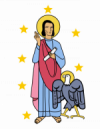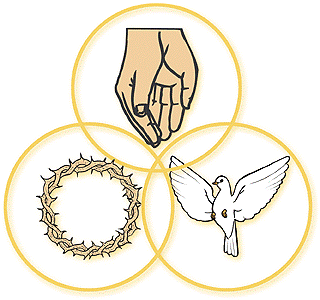Message – Trinity Sunday, May 30, 2021
Trinity Sunday
Trinity Sunday, officially called “The Solemnity of the Most Holy Trinity,” is one of the few celebrations of the Christian Year that commemorates a reality and doctrine rather than a person or event. On Trinity Sunday, Christians remember and honor the eternal God: the Father, the Son, and the Holy Spirit. Trinity Sunday is celebrated the Sunday after Pentecost, and lasts only one day, which is symbolic of the unity of the Trinity. Eastern Churches have no tradition of Trinity Sunday, arguing that they celebrate the Trinity every Sunday. Westerners also commemorate the Trinity at every Eucharist, although they set aside a special feast day for the purpose as well.
The Trinity is one of the most fascinating – and controversial – Christian teachings. The Trinity is described as a “mystery.” By mystery the Church does not mean a riddle, but rather the Trinity is a reality above our human comprehension that we may begin to grasp, but ultimately must know through worship, symbol, and faith. It has been said that mystery is not a wall to run up against, but an ocean in which to swim.
Common wisdom is that if you discuss the Trinity for longer than a few minutes, you will slip into heresy, because you are probing the depths of God too deeply. The Trinity is best described in the Niceno-Constantinopolitan Creed, commonly called the Nicene Creed.
Essentially the Trinity is the belief that God is one in essence (Greek ousia), but distinct in person (Greek hypostasis). The Greek word for person means “that which stands on its own,” or “individual reality,” and does not mean the persons of the Trinity are three human beings. Therefore Christians believe that the Father, the Son, and the Holy Spirit are somehow distinct from one another (not divided though), yet completely united in will and essence. How can this be? Well, think of the sight of two eyes. The eyes are distinct, yet one and undivided in their sight. Another illustration to explain the Trinity is the musical chord. Think of a C-chord. The C, E, and G notes are all distinct notes, but joined together as one chord the sound is richer and more dynamic than had the notes been played individually. The chords are all equally important in producing the rich sound, and the sound is lacking and thin if one of the notes is left out.
The Son is said to be eternally begotten of the Father, while the Holy Spirit is said to proceed from the Father through the Son. Each person of the Trinity interpenetrates one another, and each has distinct roles in creation and redemption, which is called the Divine economy. For instance, God the Father created the world through the Son and the Holy Spirit hovered over the waters at creation.
https://prayerist.com/trinitysunday.html

